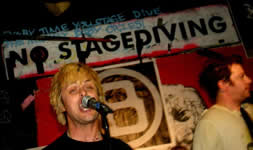Fans at seminal punk club 924 Gilman Street in Berkeley, CA were treated to a very special homecoming when the venue played host to its first Pinhead Gunpowder show since 1993. Singer, Billy Joe Armstrong hasn’t been allowed to perform at Gilman since Green Day signed to Reprise/Warner in 1993, which banished them from the independent-only club.
A $6 hand stamp was only available at the door on the day of the show, as Gilman (officially known as the Alternative Music Foundation) never does advance sales; and despite the show being largely unpublicized to prevent unwanted attention from the likes MTV and major press agencies, a line had already began to form by noon in the unseasonably warm Bay Area sun, for the show whose doors wouldn’t open until 5:00PM.
Inside the venue, a star-studded cast began to take form, with lurking local heroes like Jesse Luscious and Robert Eggplant from legendary East Bay punk outfit Blatz; Steve Koepke, who, for nearly two decades, has hand-distributed his painstakingly thorough list of upcoming local shows—aptly called The List; and Armstrong’s Green Day band mate, Mike Dirnt, to name but a few.
Armstrong lingered in and out of the club, dressed in a frumpy hooded sweatshirt and an over-sized hat, seemingly in an attempt to avoid recognition. Also in the mix was the rest of Pinhead Gunpowder: bassist Bill Schneider, guitarist Jason White (who was part of Green Day for a short time) and drummer Aaron “Cometbus” Elliot, the ‘punk Kerouac’ known for journalizing his travels in the ‘zine Cometbus since the 80’s.
 By 7:00, the 250-person capacity venue was sweating and brimming. As Pinhead Gunpowder set up, the crowd was pressed so tight against the stage and from wall to wall on either side, it was as if the seams of the club would split. When Armstrong took the stage much of the crowd was swept with frenzy, cooing and shouting. Older punks stood in awe, both excited to see the show by the long-beloved Pinhead Gunpowder, but also a bit rankled by the gut-wrenching star-struck-ness of the younger fans.
By 7:00, the 250-person capacity venue was sweating and brimming. As Pinhead Gunpowder set up, the crowd was pressed so tight against the stage and from wall to wall on either side, it was as if the seams of the club would split. When Armstrong took the stage much of the crowd was swept with frenzy, cooing and shouting. Older punks stood in awe, both excited to see the show by the long-beloved Pinhead Gunpowder, but also a bit rankled by the gut-wrenching star-struck-ness of the younger fans.
Before the set, Armstrong made one request to the audience. “Let’s ditch the cell phones and digital cameras.” Many roared in agreement, but nonetheless the flashbulbs flickered.
With the first note, the crowd surged forward and crushed the largely tiny youth in the front. The immobile ‘pit’ swayed left and right like a riotous pendulum, dozens of hands stuck in the air, struggling to maintain their grip on their precious, though unwelcome, phones and cameras. Karma truly is a bitch.
Belting through song after song with hardly a pause, the band played favorites like “Losers Of The Year” and “Mpls” as well as their cover of Joni Mitchell’s “Big Yellow Taxi.”
Armstrong dedicated a song to Dirnt, and another, “to all the babies here tonight.” This would include the frontman’s own son, who stood sidestage along with several adolescent revelers. He also gave brief singing tributes to John Denver’s “Take Me Home, Country Road” and Don MacLean’s “The Day The Music Died” (to which White commented, “I hate that song.”) In addition to the familiar hits, the set test-ran two new songs—“Westside Highway” and “The Anniversary Song”—out of three tracks recently recorded and destined for a seven-inch record release.
 The closer for the night was another cover—and certainly their oddest. Originally sung by Diana Ross, PG’s ‘outro’ was the Theme from Mahogany (“Do You Know Where You’re Going To”). Unimaginable as it may be, as with “Big Yellow Taxi,” the Midas of pop-punk anthems reinterpreted the song with his trademark exaggerated California accent, making it sound like an Armstrong original.
The closer for the night was another cover—and certainly their oddest. Originally sung by Diana Ross, PG’s ‘outro’ was the Theme from Mahogany (“Do You Know Where You’re Going To”). Unimaginable as it may be, as with “Big Yellow Taxi,” the Midas of pop-punk anthems reinterpreted the song with his trademark exaggerated California accent, making it sound like an Armstrong original.
With that, Pinhead Gunpowder swiftly left the stage. The house briefly piped in recorded music as the crowd started to demand an encore—said music would normally signal that one was planned; but security quickly called to the sound booth for silence and began encouraging the mob toward the doors. The set was scheduled to continue for another fifteen minutes, so it is hard to say if a planned encore was cancelled (if so, presumably due to the relentless flashbulbs) or if the band’s breathless transitions just got through the gig early.
In any case, it is certain that this was as much a nostalgic return for Armstrong and the rest of the band as it was for the old fans—to the time when Pinhead Gunpowder was at its height and Green Day was just about to explode. Even the kids who were just getting born (or not even) got a once in a lifetime glimpse at those glory days of East Bay Punk. At $6, it would have been a bargain at twice, if not three times the price, but it was a fitting respect to the essence of that time.
www.myspace.com/phgp27
www.924gilman.org







